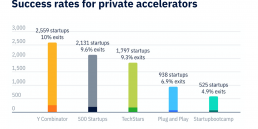Private Accelerators
0 Comments4 Minutes
We’ve seen quite a few situations of new accelerators popping up, copying the YCombinator or TechStars model and expecting that hope (or “spray and pray”, how it’s often called in the investment world) will lead to success. In most cases, within three years, most of these ventures turned into a proper seed fund, an educational program, a corporate marketing initiative, or they just died (unfortunately, there is no clear data of this—maybe we’ll look at it in a further study).
Mentoring Beyond Bragging Rights and Looking Good
0 Comments6 Minutes
Matching mentors with startups is a tedious process for various reasons. Many startups chase famous/known mentors, who have less availability, while disregarding less popular mentors who might be more willing to give time and help. Matching mentors with startups in the beginning is not a guarantee of effective mentoring throughout the program.
Education Is Essential for Incubation but Disruptive for Acceleration
0 Comments6 Minutes
Acceleration should not be an educational program ending with a Demo Day, but a process aimed at helping build successful business by offering the right support. Build your acceleration process to help you reach your end goals, considering the available resources.
Lack of Reporting Discipline Is Most Often the Accelerator’s Fault
0 Comments3 Minutes
Getting startups to report during and after the program is a challenge for most accelerators, but the discipline of reporting should be enforced and grown within the programs.
4 Essential Metrics for eCommerce Startups
0 Comments10 Minutes
While the giants of the business world (Amazon, Walmart, Alibaba) are dominating the space, there is still room for a lot of growth when looking at the fact that 1.8 billion people have made purchases online in 2018—a number that is expected to grow to 2.14 billion in 2021.
Focus May Increase Efficiency, But Doesn’t Guarantee Better Deals
0 Comments3 Minutes
Today, there is an abundance of options for startups. This makes the competition fierce, so accelerators have to find ways to appeal to top startups. Specialization is the most common strategy to tackle deal flow quantity and quality.
Deal Flow Is a Major Challenge for 2/3 of Accelerators
0 Comments4 Minutes
Two out of three accelerators have mentioned Deal Flow as their main challenge, whether it's related to quality, quantity or both. Here are a couple of findings related to this and some thoughts on how to tackle this issue.
Disciplined Accelerators: Introduction
2 Comments8 Minutes
A series of articles detailing the findings and insights from a research study carried on more than 170 accelerators.
4 Essential Metrics for SaaS Startups
3 Comments16 Minutes
More and more companies are integrating SaaS tools to help with their processes, which means a lot of growth is forecasted for these types of startups. But knowing how to evaluate the health of a company means looking at the relevant metrics. Here is a list of essential metrics to keep track of when dealing with SaaS startups.
3 Essential Metrics for Marketplace Startups
0 Comments12 Minutes
Some of the biggest players in the game, the unicorns that made it on every startups’ “when I grow up” list, are companies that have achieved success by creating platforms which ease transactions between two different sides. Amazon, Airbnb, eBay, Craigslist and Uber are a few examples of marketplaces that became giants in the industry. In Asia, marketplaces are some of the fastest-growing startups.









